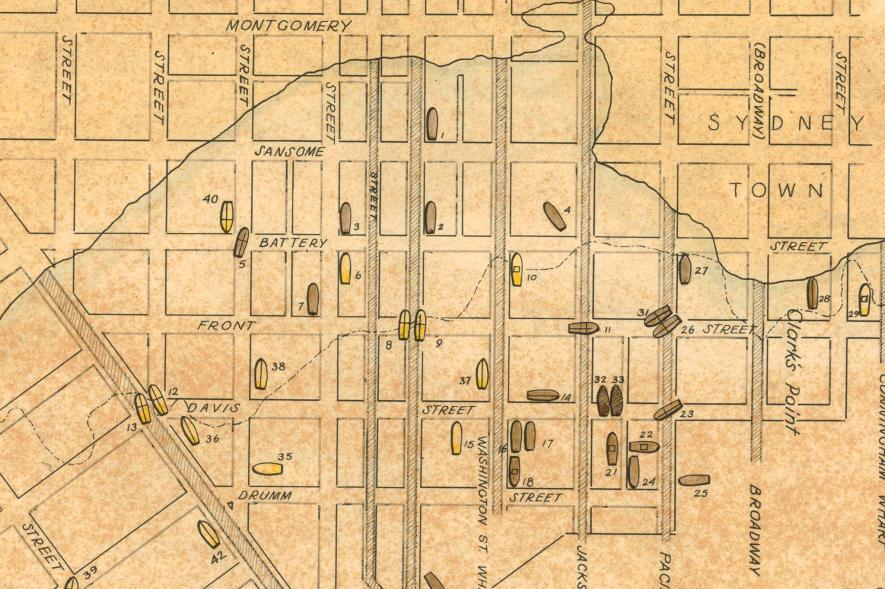
Sydney Town was once a harbor...
In 1848, California's "Gold Rush" began. Tales of fortune quickly spread across the Pacific Ocean, where eager explorers boarded ships by the hundreds to test their luck in the open seas and the golden-coast that awaited them. In San Francisco, these ships were greeted in a harbor district called Yerba Buena Cove.
Thousands of emptied wooden vessels were kept here. Most awaiting their owners to return pockets full of the fortune that they had set out for. But few ever came back. Most either stayed in California or didn't have the funds needed to make the return voyage. It was an eerie site to see a "forest of masts" swaying back and forth. Hundreds were left idle and empty. Many of the abandoned were reclaimed as warehouses, rowdy wild-west saloons, as houses or hotels.
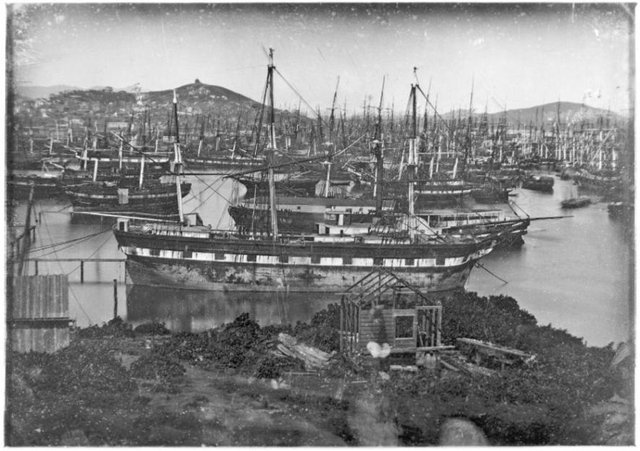
Over time, the Gold Rush era faded... but the demand for real estate in San Francisco began to boom. Some ships were purposefully sunken in order for the sinker to lay claim to the land above it. It was a bizarre scene of building land atop of sunken ships and a city looking to expand. This cove in particular was filled in with sand soil and debris to make way for new streets and avenues.
Suddenly, the graveyard of ships disappeared and a city emerged on top of it.
Re-Discovering a Lost Sea-scape
In the 1990's, a construction team was boring a tunnel to extend a subway line beyond San Francisco's Market Street and had to pass directly through the hull of a ship! Archeologists later found that this ship was called "the Rome." As below-ground infrastructure grew to meet the demands of a growing city, more and more ghost ships were getting carved up. This expansion underground fueled new archeological research into the history of California's 19th century coastline.
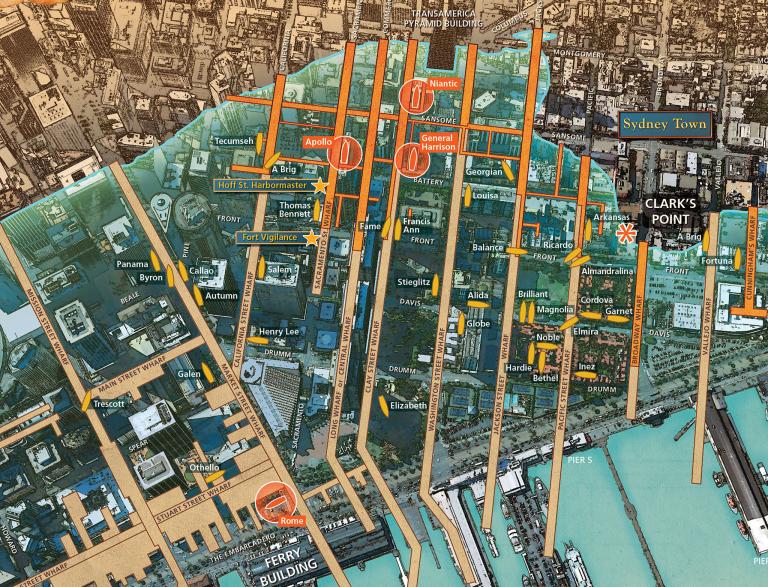
- Super-imposed map of identified ships and existing city streets. Image source National Geographic
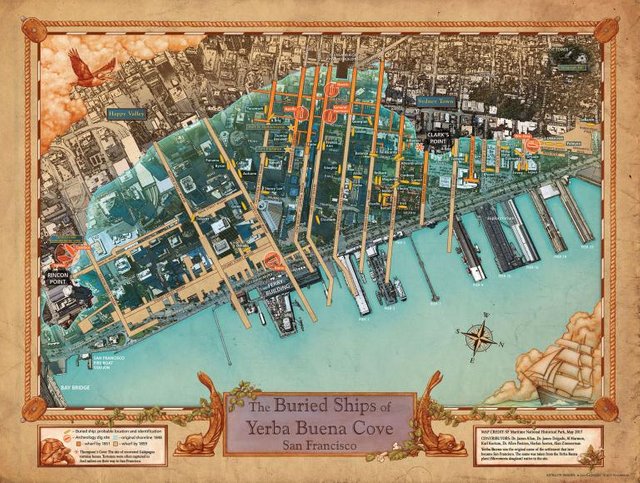
Coastal Cities / Layered History
In a previous post - I wrote about the "Ancient Rivers Below Manhattan", visible in the time lapse graphic below. Long before it was called the "concrete jungle" - Manhattan was a marshy island home to nearly 60 miles of streams and natural springs. Coastlines are dynamic and ever-changing environments. Over the course of decades and centuries, cities bury their history and build in layers above it. Every once and a while, an artifact is discovered below and a story from the past emerges...
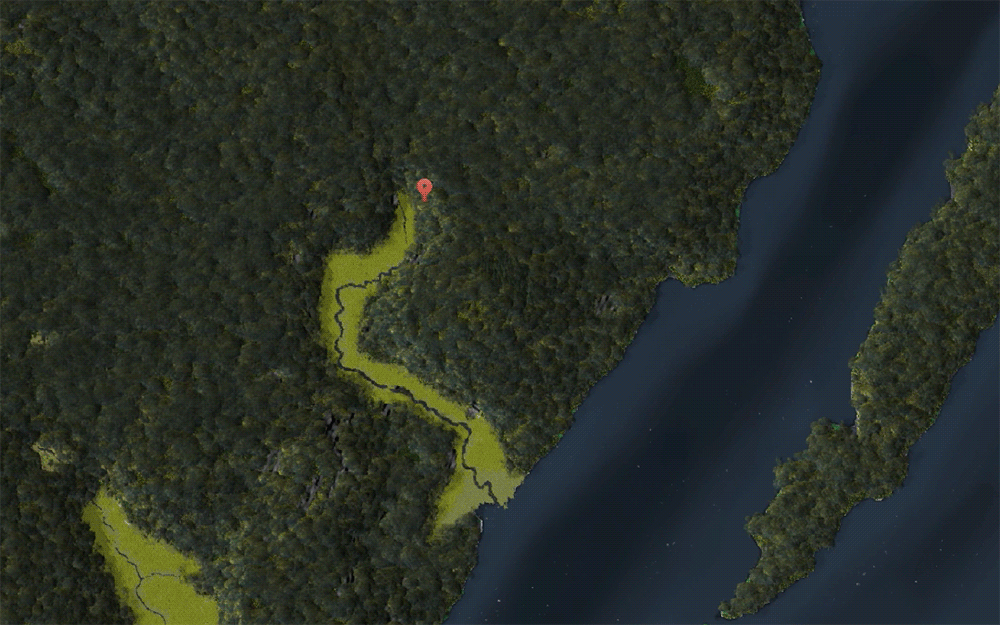

Made a great read on a lazy Monday afternoon! Thanks for putting this together. I enjoy reading pieces on history and this was just great.
If you find sometime feel free to check some of my blogs. :)
Downvoting a post can decrease pending rewards and make it less visible. Common reasons:
Submit
Thanks so much @firepower! Glad you enjoyed it :)
Downvoting a post can decrease pending rewards and make it less visible. Common reasons:
Submit
Nice. The Canadian government and private contractors have found the remains of the Franklin Expedition ships on a mission to find the NW Passage. It's a fascinating story.
http://news.nationalpost.com/news/canada/franklin-researchers-hope-to-link-dna-from-doomed-sailors-bones-with-living-descendants
Downvoting a post can decrease pending rewards and make it less visible. Common reasons:
Submit
What a wild story! Very intriguing, thanks for sharing this.
Downvoting a post can decrease pending rewards and make it less visible. Common reasons:
Submit
Simply love topography, old maps and investigations of it. This was a pleasant article to read, upvote!
Downvoting a post can decrease pending rewards and make it less visible. Common reasons:
Submit
It's amazing to see how old maps can be revisited and continually remade. This is such a neat example of uncovering those layers and narratives.
Downvoting a post can decrease pending rewards and make it less visible. Common reasons:
Submit
wow, interesting story I dint know that. Thanks for sharing such piece of history.
Downvoting a post can decrease pending rewards and make it less visible. Common reasons:
Submit
I'm glad you enjoyed it :)
Downvoting a post can decrease pending rewards and make it less visible. Common reasons:
Submit
Arrrrrg Matey!
Downvoting a post can decrease pending rewards and make it less visible. Common reasons:
Submit
... says the SF subway conductor. Get it? Because underground pirates?
Downvoting a post can decrease pending rewards and make it less visible. Common reasons:
Submit
Very interesting, aren't these landfills more vulnerable to natural disasters like earthquakes?
Downvoting a post can decrease pending rewards and make it less visible. Common reasons:
Submit
Good observation. You would think that the soil below would be a little shifty, especially if waterlogged. I'd bet there are some voids or pockets that need structure. (I'd bet that would be a super expensive undertaking though)
Downvoting a post can decrease pending rewards and make it less visible. Common reasons:
Submit
Great History info, its amazing history very few people knows it. thanks to share.
Downvoting a post can decrease pending rewards and make it less visible. Common reasons:
Submit
Of course, thanks for the kind words!
Downvoting a post can decrease pending rewards and make it less visible. Common reasons:
Submit
Very interesting post!
Downvoting a post can decrease pending rewards and make it less visible. Common reasons:
Submit
thanks team101!
Downvoting a post can decrease pending rewards and make it less visible. Common reasons:
Submit
That's awesome!!, I had no idea. Thanks for the piece of history.
Downvoting a post can decrease pending rewards and make it less visible. Common reasons:
Submit
Wild to learn about the cities in hiding beneath us! There's a ton of history along the coast.
I might to an extended series on these...!
Downvoting a post can decrease pending rewards and make it less visible. Common reasons:
Submit
Fascinating post! I'm a big fan of history. This was a very interesting read. Thank you!
Downvoting a post can decrease pending rewards and make it less visible. Common reasons:
Submit
Thanks @jdawg, glad you enjoyed it. Such a neat story.
Downvoting a post can decrease pending rewards and make it less visible. Common reasons:
Submit
Its crazy what gets left behind
Downvoting a post can decrease pending rewards and make it less visible. Common reasons:
Submit
It really is. In the most bizarre of places sometimes...
Downvoting a post can decrease pending rewards and make it less visible. Common reasons:
Submit
This is so crazy!!!
Downvoting a post can decrease pending rewards and make it less visible. Common reasons:
Submit
Wild!
Downvoting a post can decrease pending rewards and make it less visible. Common reasons:
Submit
Quite fascinating!
Downvoting a post can decrease pending rewards and make it less visible. Common reasons:
Submit
Thanks for the kind comment!
Downvoting a post can decrease pending rewards and make it less visible. Common reasons:
Submit
Great post, i appreciated for that artifact
Downvoting a post can decrease pending rewards and make it less visible. Common reasons:
Submit
Awesome post! Followed!
Downvoting a post can decrease pending rewards and make it less visible. Common reasons:
Submit
Nice, thanks for the support :D
Downvoting a post can decrease pending rewards and make it less visible. Common reasons:
Submit
great blog....love it....upvote and resteem for u
Downvoting a post can decrease pending rewards and make it less visible. Common reasons:
Submit
Really interesting article, thanks
Downvoting a post can decrease pending rewards and make it less visible. Common reasons:
Submit
This post received a 13% upvote from @randowhale thanks to @voronoi! For more information, click here!
Downvoting a post can decrease pending rewards and make it less visible. Common reasons:
Submit
I lived in California most of my life and never heard this story. Thanks for educating me.
Downvoting a post can decrease pending rewards and make it less visible. Common reasons:
Submit
Great story! Love American History especially!
Downvoting a post can decrease pending rewards and make it less visible. Common reasons:
Submit
Hi! Have you heard about @krwhale? It is similiar with @randowhale. For your information please click on.
Downvoting a post can decrease pending rewards and make it less visible. Common reasons:
Submit